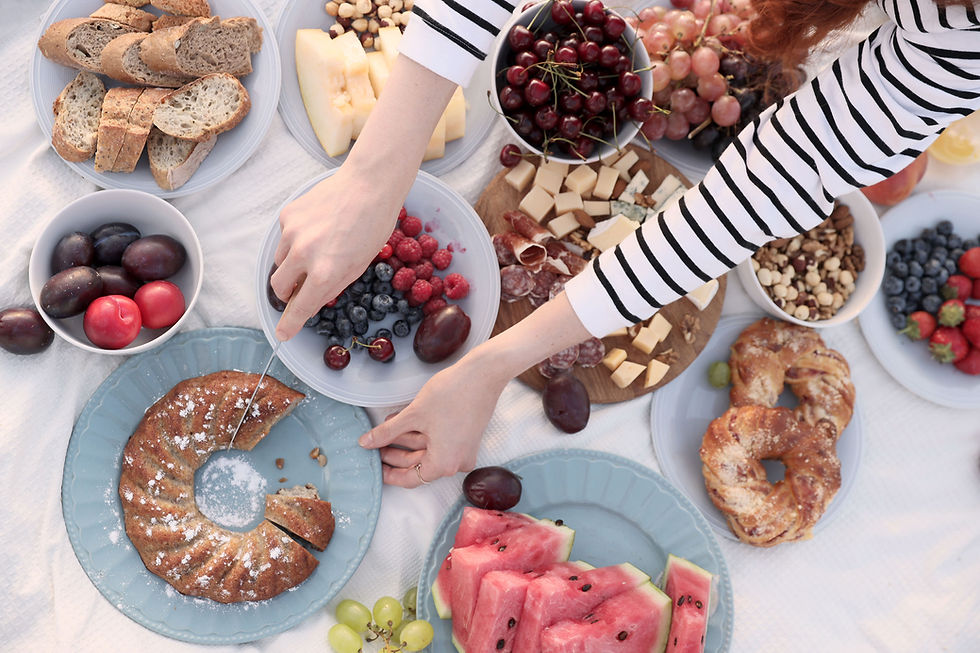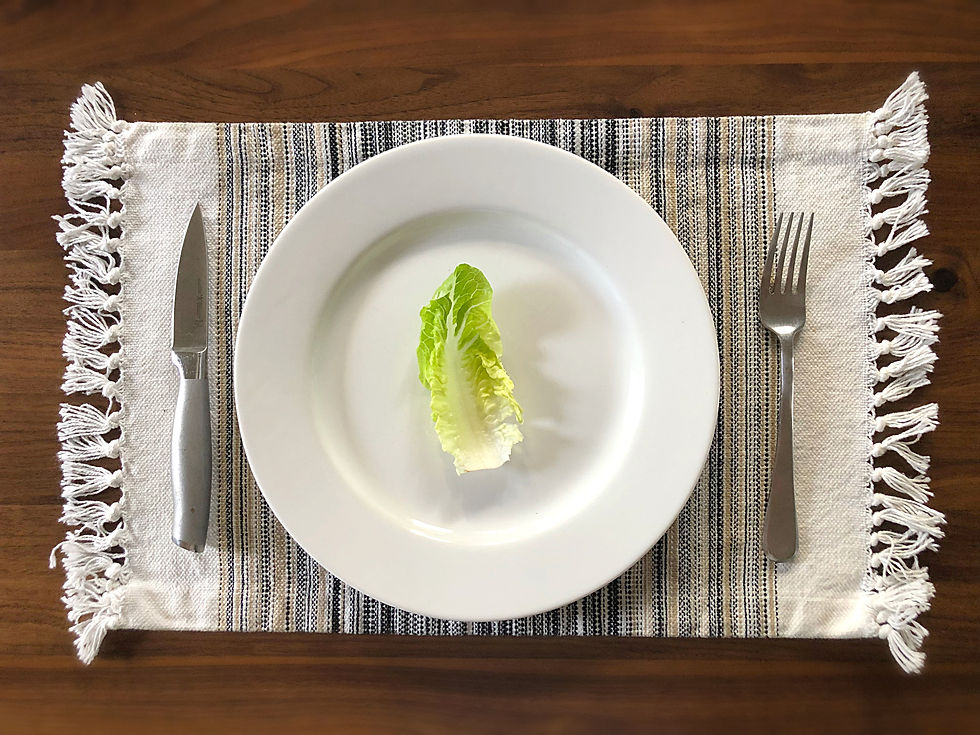My Journey to Intuitive Eating
- naturallynatalierdn

- Sep 15, 2022
- 7 min read
Updated: Jan 31, 2024
Written by Natalie Faella Pirolli, MS, RDN, LDN | September 15, 2022

At first glance, you might think all dietitians, nutritionists, and dietetics students are healthy and have a healthy relationship with food. Though our society’s skewed version of what "healthy" looks like (i.e., thin person, disciplined with eating and exercise), can keep us from seeing the truth. I was one of those nutrition students who maybe appeared "healthy" from the outside but was having a different experience inside.
I always had an interest in all things nutrition and health, and in college that interest snowballed into an obsession. As you may have noticed yourself, it’s very easy to fall down the rabbit hole of food-obsessing. You go from reading "carbs are bad" on the internet to cutting out bread and pasta from your diet, to worrying fruit has too much sugar so you stop eating that too, to eliminating starchy veggies, then veggies altogether… It can very quickly spiral into all-or-nothing thinking (for some reason, the "everything in moderation" truth about eating is so hard for us to accept). So imagine how quickly that can escalate when you’re spending hours each week learning about nutrition.
It's very easy to fall down the rabbit hole of food-obsessing... for some reason, the "everything in moderation" truth about eating is so hard for us to accept.
My view of "health" became very black and white. "High saturated fat intake is linked to heart disease? I’ll have 0 saturated fats in my diet." "Some studies say vegetarians are healthier? Goodbye animal proteins." "All you have to do is cut out 500 calories per day to lose weight? That should be easy…" Between the many factual (not practical)* lessons in nutrition I was receiving, and some other key factors: fear of gaining "the freshman 15," the mystery meat in the dining hall, my perfectionistic tendencies, and a highly critical view of myself at the time—my diet became very limited.
I look back and think about how little I was eating each day; my unexciting, low calorie, low fat, low protein diet that I coupled with walking miles around a huge campus and doing cardio each day at the gym, and it’s no wonder I felt so physically and mentally drained at that time. As I learned later working as an RD, by underfeeding and lacking SO many key nutrients in my diet, I was actually worsening my stress, anxiety, and self-esteem, while also enhancing my perfectionism and obsession with "health." It’s funny that I felt so "in control" of my body when it was really my anxiety and perfectionism that were running the show.
By underfeeding and lacking so many key nutrients in my diet, I was actually worsening my stress, anxiety, and self-esteem...
These disordered thoughts and eating patterns (which I didn't realize at the time were actually disordered or problematic) continued through grad school before I experienced a complete 180 in the working world. I became somewhat anti-health, which frankly, I think resulted from the exhaustion of trying to be perfectly "healthy" for so long. I also had started working in eating disorder treatment and think I was feeling a lot of anger towards the diet industry and the toxic wellness culture that had influenced so many of my clients’ serious eating disorders. Seeing the toll these disorders took on their lives (and the lives of their family members/caregivers) was heartbreaking. At this time I was also going through a heartbreak of my own and coping in unhealthy ways like drinking too much on the weekends, not getting enough sleep or quality foods in my diet, and really just not taking good care of myself. I didn’t feel good about myself and on some level felt like I didn’t deserve or care about myself enough to engage in healthy habits like eating more of a balanced diet and moving in ways I used to enjoy. When I exercised, it was just because I felt guilty for all the calories I had drunk and eaten—it wasn’t for me at all.
Then intuitive eating entered my life. I had a new job that required me to read and learn more about intuitive eating and realized it was something I needed to incorporate into my own life. At this point, I had already started making efforts to eat more balanced meals, drink less, and move more, but the "why" wasn’t for me yet. It wasn’t until I started putting the intuitive eating principles into practice that I could honestly say the only thing influencing my eating and exercise habits was myself—my physical and mental health, my happiness, my preferences, my lifestyle, my energy levels, and not the pressure from society or the scale (which I threw out around this time). Around this time I also started taking care of my mental health more by speaking with a therapist for help with my anxiousness and journaling regularly. (I know this was a helpful piece of the puzzle, too, so worth mentioning.)
I went from exercising in ways I felt like I "should," to moving in ways that boosted my mood and energy, and felt good in my body. I went from eating as little as possible to maintain a certain body "ideal," to overeating foods and drinks to fill a void, to tuning in and enjoying all aspects of the eating experience from food shopping, to cooking, and of course eating. I went from thinking about how I was going to have to "burn off" everything I was eating and drinking during wine nights with my friends, to being more present and truly enjoying the food and girl time.
Instead of viewing food as the enemy or something I needed to establish rules around, I started appreciating all food had to offer me: pleasure, comfort, nutrients, the functions of those nutrients on my physical and mental health, the act of gathering with loved ones to eat, and so on. My curiosity for food started growing too and I was eager to try new restaurants and make new dishes—not so I could control the portions and ingredients, but so I could enjoy the whole cooking and eating experience. I now eat with the intention of truly nourishing myself: body, mind, and spirit.
I started appreciating all food had to offer me: pleasure, comfort, nutrients... the act of gathering with loved ones to eat...
This doesn’t mean I’m completely in tune all of the time. I still have those times where I come to it and realize I’ve mindlessly stress-eaten a bag of Goldfish, or I ordered what I thought I "should" eat for dinner instead of what I really wanted and find myself unsatisfied and picking from the fridge and cabinets after. Or I have those thoughts (like before my wedding and honeymoon) that maybe I should exercise more to lose just a little weight, or tone up certain parts of my body so I look "good" for people, pictures, pool days… not for my health, strength, or stamina. Or how I kept clothes from college for years in hopes that I’d be "that skinny" and could fit into them again. Practicing intuitive eating is doing just that—practicing. Working at it, non-judgmentally, while reaping the benefits of breaking up with diet culture and developing a more positive relationship with ourselves. Our relationship with food and our body didn't develop overnight so it will take some time and continued effort to heal.
Practicing intuitive eating... working at it, non-judgmentally, while reaping the benefits of breaking up with diet culture and developing a more positive relationship with ourselves.
I look back and realize I have experienced two health extremes. One where I was in that "scared" health mode, where I was doing things out of fear; fear of gaining weight, fear of not choosing the healthiest food choice at all times, fear of what would happen to my body and my health if I missed a workout, and so on. The other extreme was this kind of "f*ck it" mentality where I was done being so restrictive and obsessing SO much so I told myself I did not care about how I looked (though I very much did) or how I treated my body. My weight fluctuated significantly during these times, and while I know my "extremes" may not come close to what others have experienced, I can say that I know what it’s like to have to find your way to intuitive eating. And to have to continue to work on it.
My personal experience, and the experiences of my clients, have made me want to help others find more balance in their lives and spread the word about intuitive eating. I want to help others leave behind the pressures and impossible demands of diet culture that only leave us feeling worse about ourselves and hungry—physically, mentally, and emotionally hungry. I want to help break the chain of diet mentality that gets passed down from generation to generation and promote health and wellness in a more positive light to help reduce the risk and occurrence of eating disorders. I want to help people let go of the food rules and regulations they've learned and start looking within to learn how to trust themselves around food and improve the relationship they have with food and their body.
Thank you for reading and letting me share my story with you. You may relate to parts of my story, either feelings or situations you have experienced or are currently experiencing. If any of this resonates with you or you’re interested in learning more about intuitive eating, subscribe to my monthly newsletter or reach out to learn more about working together!
*In school I feel like I didn't zoom out to see the whole picture or how our diet and lifestyle habits as a whole impact our health. I hyperfocused on specifics, especially the negative ones (for example: a diet high in saturated fat can increase the risk for heart disease) instead of the role balance plays (for example: how saturated fats have a place in our diets and don't need to be avoided entirely and that we can incorporate fiber, omega-3s, exercise, etc. to boost heart health).



Comments